

12 Mobile Apps That Help Relieve Stress And Anxiety : TECH : Tech Times. Everyone wants to be happy, that's for sure.
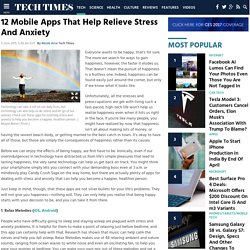
The more we search for ways to gain happiness, however, the faster it eludes us. That doesn't mean the pursuit of happiness is a fruitless one. Indeed, happiness can be found easily just around the corner, but only if we know what it looks like. Unfortunately, all the stresses and preoccupations we get with living such a fast-paced, high-tech life won't help us realize happiness even when it hits us right in the face. If you're like many people, you might have realized by now that happiness isn't all about making lots of money, or having the sexiest beach body, or getting married to the best catch in town.
Before we can enjoy the effects of being happy, we first have to be. Just keep in mind, though, that these apps are not silver bullets for your life's problems. 1. People who have difficulty going to sleep and staying asleep are plagued with stress and anxiety problems. Tech to take the stress out of stress. Image copyright Thinkstock Mairin Philips (not her real name) suffered from anxiety, so much so that it made the pain from a stomach ulcer far worse.

Then a friend suggested a handheld anti-anxiety device. "I was keen to give it a try, but was not convinced it would be of benefit to me," she says. Anxiety Relief Practice. Anxiety Attacks Cure - Self Help Anxiety Treatment. Example of a virtual environment used in Virtual Reality Exposure Therapy for Fear of Flying. Virtual Reality Therapy for Panic Disorder, Agoraphobia, and Specific Phobias. Virtual Reality Treatment for Anxiety. VR therapy can help treat PTSD and anxiety. Oculus/Tech Insider For many of us, something in the world can trigger a disproportionate or even irrational fear response.
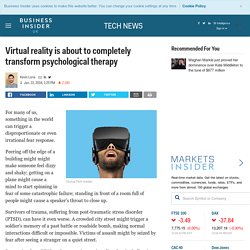
Peering off the edge of a building might might make someone feel dizzy and shaky; getting on a plane might cause a mind to start spinning in fear of some catastrophic failure; standing in front of a room full of people might cause a speaker's throat to close up. Survivors of trauma, suffering from post-traumatic stress disorder (PTSD), can have it even worse. A crowded city street might trigger a soldier's memory of a past battle or roadside bomb, making normal interactions difficult or impossible. Victims of assault might by seized by fear after seeing a stranger on a quiet street.
Recovering from PTSD and overcoming anxiety disorders is challenging, time-consuming work; it's also essential for the many people who suffer from these conditions. Virtual reality in therapy now There's a lot of research that backs up the potential clinical uses of VR. Technology Helps Prevent and Treat Anxiety. For most freshmen entering Penn State, transitioning to college life can be a challenge.
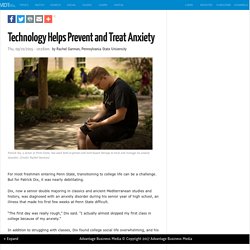
But for Patrick Dix, it was nearly debilitating. Dix, now a senior double majoring in classics and ancient Mediterranean studies and history, was diagnosed with an anxiety disorder during his senior year of high school, an illness that made his first few weeks at Penn State difficult. “The first day was really rough,” Dix said. “I actually almost skipped my first class in college because of my anxiety.” In addition to struggling with classes, Dix found college social life overwhelming, and his anxiety nearly prevented him from enjoying what he loves most about Penn State: the football program. “I’ve been a Penn State football fan since I was born,” Dix said. Assistive Technology (Mental Health) — Accessibility Resources for Advocates. Assistive technology (AT) is a generic term that includes assistive, adaptive, and rehabilitative devices for people with disabilities.

Assistive technology for people who have mental health disabilities can help them cope with daily challenges such as organization, remembering key dates or events, or calming themselves. Electronic or paper planners help remind people of appointments and to-do lists. Soothers are objects or devices that a person uses to stay calm. Soothers include electronic devices such as sound machines, but can be something as simple as a stone carried in the hand or pocket. 15 Small Steps You Can Take Today to Improve Anxiety Symptoms. “Anxiety is a normal, predictable part of life,” said Tom Corboy, MFT, the founder and executive director of the OCD Center of Los Angeles, and co-author of the upcoming book The Mindfulness Workbook for OCD.
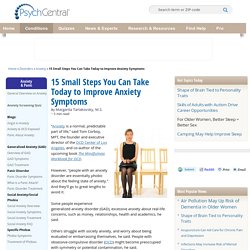
However, “people with an anxiety disorder are essentially phobic about the feeling state of anxiety.” And they’ll go to great lengths to avoid it. 19 Natural Remedies for Anxiety. Anxiety Disorders and Anxiety Attacks: Recognizing the Signs and Symptoms and Getting the Help You Need. What you can do Learn to recognize the signs, symptoms, and types of anxietyRecognize that anxiety affects the whole body with a wide range of physical symptoms Make it a priority to connect face-to-face with supportive peopleMove your body frequently—don’t sit for more than an hourGet the full amount of restful sleep that you requireLearn about and practice relaxation techniquesLearn more by reading the related articles What's the difference between normal stress and anxiety?
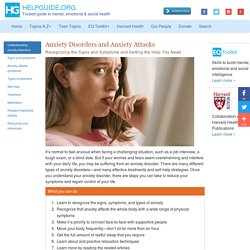
Common Anxiety Triggers for Anxiety and Panic. 21 Anxiety Triggers That Might Surprise You. If you suffer from anxiety, you’re not alone.
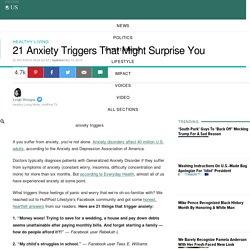
Anxiety disorders affect 40 million U.S. adults, according to the Anxiety and Depression Association of America. Doctors typically diagnose patients with Generalized Anxiety Disorder if they suffer from symptoms of anxiety (constant worry, insomnia, difficulty concentration and more) for more than six months. But according to Everyday Health, almost all of us have experienced anxiety at some point. What triggers those feelings of panic and worry that we’re oh-so-familiar with? We reached out to HuffPost Lifestyle’s Facebook community and got some honest, heartfelt answers from our readers. 1. What causes anxiety. An anxiety condition isn't developed or caused by a single factor but a combination of things.
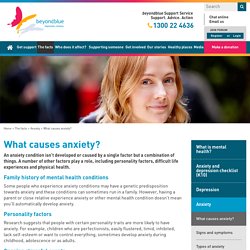
A number of other factors play a role, including personality factors, difficult life experiences and physical health. Family history of mental health conditions. How Anxious are YOU (and what can you do about it) Everyone experiences anxiety.
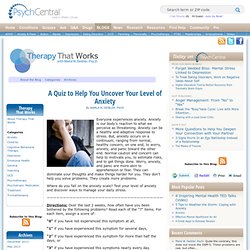
Anxiety is our body’s reaction to what we perceive as threatening. Anxiety can be a healthy and adaptive response to stress. But, anxiety occurs on a continuum, ranging from normal, healthy concern, on one end, to worry, anxiety, and panic toward the other end. Dwelling on Stressful Events Can Up Inflammation. By Janice Wood Associate News Editor Reviewed by John M. Grohol, Psy.D. on March 15, 2013 Dwelling on stressful events can increase levels of inflammation in the body, according to a new study.
Researchers from Ohio University discovered that when study participants were asked to ruminate on a stressful incident, their levels of C-reactive protein, a marker of tissue inflammation, rose. The study is the first to directly measure this effect in the body, according to Dr. Peggy Zoccola, an assistant professor of psychology. “Much of the past work has looked at this in non-experimental designs,” she said. For this study, the research team recruited 34 healthy young women. How Anxiety Can Impair Communication. Communication between two or more people involves a lot of different mental mechanisms.
One part of your brain is controlling your listening ability. Another part of your brain is deciphering what the other person is saying. Another part is formulating what to respond with, and another part of your brain is used to share the response. Anxiety panic phobias. Introduction Anxiety is a feeling we all get in a situation that is threatening or difficult. MOODJUICE - Anxiety - Self-help Guide. Once you have recognised an unhelpful thought the next stage is to challenge it. To do this, you can ask yourself a serious of questions. See the example below: Once you have asked yourself these questions, you should read through your answers. Try to come up with a more balanced or rational view.
For example: Worrying about failing is doing me no good. Try to apply these questions to the unhelpful thoughts that you notice. Problem Solving. Anxiety and panic attacks.